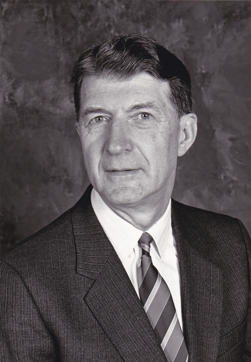Leading British hydrogeologist and William Smith Medallist who developed a national water plan for England and Wales

Dr Richard Allen Downing, known universally as Dick, collapsed and died in Oxford on 28 June 2013. One of Britain’s leading hydrogeologists, he was born on 18 March 1928 in Newcastle-upon-Tyne and educated at Gateshead Grammar School and Durham University, where he read Geology as a Shell Scholar. After graduating in 1949 with 1st Class Honours he joined the Geological Survey as a field geologist but his career was soon interrupted by National Service, where he was commissioned in the Royal Engineers. His National Service, followed by Reserve service in charge of a well-drilling unit, provided him with a fund of anecdotes that could still amuse listeners more than 50 years later.
Back at the Survey, Dick was initially posted to the South Wales Coalfield, mapping parts of the Swansea and Newport sheets and publishing original findings, but in 1954 he joined the Water Department and began his career in hydrogeology. Working with Jack Ineson he was soon publishing on groundwater chemistry and explaining the analysis of the groundwater component of river flows.
In 1965 Dick moved with Ineson to the Water Resources Board (WRB) on its formation and was soon supervising multidisciplinary projects involved with developing a national water plan for England and Wales – an excellent document that was ignored by politicians and then reinvented by the National Rivers Authority in the 1990s. With the reorganisation of the water industry in 1974 and closure of WRB he moved to similar work in the Central Water Planning Unit, on whose behalf he also did a short spell in Saudi Arabia.
In 1979 Dick returned to the Survey, by then BGS, as Manager of the programme to investigate the geothermal potential of the UK, supervising hydrogeologists, geophysicists, geochemists and structural geologists. He retired from BGS in 1988, having served twice as Acting Chief Hydrogeologist; it was a loss to both him and the country that he did not achieve that substantive role for a long period. Everything he did was meticulously planned and executed. He was always at pains to encourage and acknowledge his junior colleagues and often gave them credit for work he had largely done himself.
Dick Downing was head and shoulders above most of his contemporaries both physically (at well over six feet) and intellectually. He had an enormous breadth of knowledge in geology and science generally, was very widely read and had a prodigious output in papers and books, recognised by the award of a DSc from Durham in 1977. Although the submission was nominally in Geology, in practice it was the first UK DSc predominantly in Hydrogeology. His contribution was further recognised by the award of the William Smith Medal in 1989.
With John Rodda and Frank Law he wrote Systematic Hydrology (1976), one of the best summaries of the hydrology of the UK ever produced; only its inappropriate title prevented it becoming more widely appreciated. After retirement in 1988 he was the instigator, lead editor and a major contributor of two Clarendon Press (OUP) monographs, Applied Groundwater Hydrology (1991) and The Hydrogeology of the Chalk of North-West Europe (1993). He was chosen to give the inaugural Ineson Lecture of the British chapter of the International Association of Hydrogeologists and the Society’s Hydrogeological Group in 1992. With David Gray he co-edited the BGS/HMSO publication on Geothermal Energy: The potential in the United Kingdom (1986). From 1993-99 he was an Honorary Research Associate of BGS, for whom he also wrote a popular account of hydrogeology: Groundwater: Our hidden asset (1998).
He remained active up to his death, latterly helping to write a history of Twyford, his home since 1960. Much of his later life was devoted to caring for his wife, Dulcie, who died in 2012. He is survived by their daughters Helen and Julia and two grandchildren.
Written by Michael Price